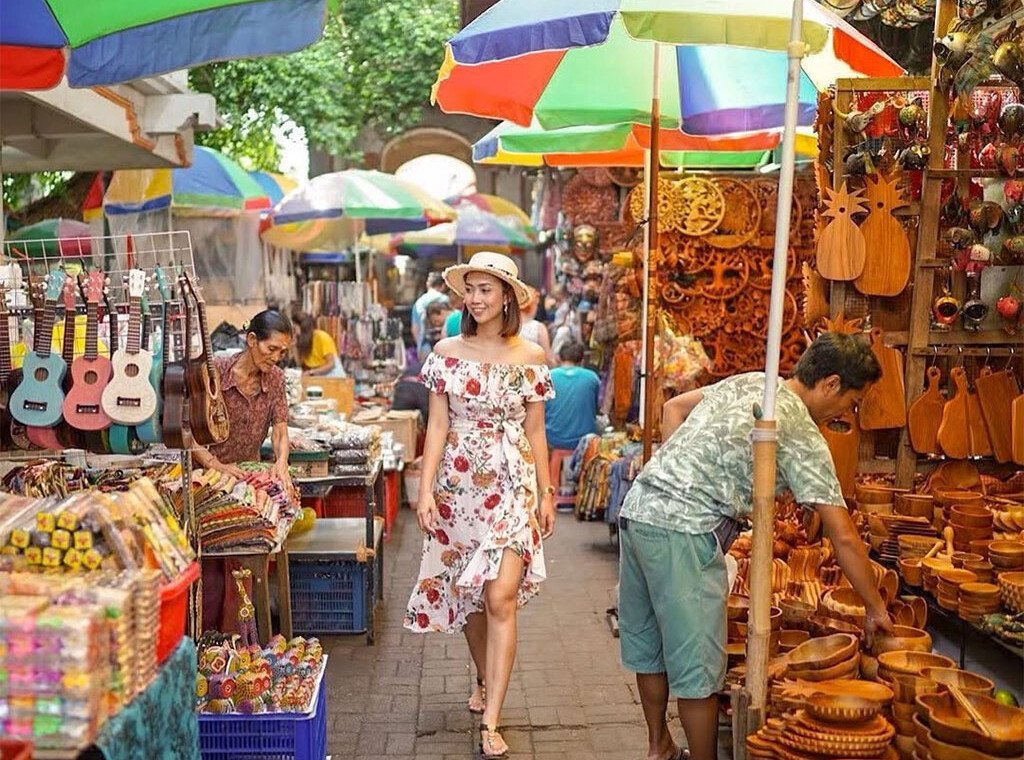Bali is a paradise of colors, crafts, and vibrant markets. For many tourists, bargaining is both a challenge and a thrill—yet most end up overpaying, missing out on local deals, or feeling awkward. What if you knew insider tips that locals use every day? Let’s unlock seven hidden tricks that can save you money and transform your Bali shopping experience—while still being respectful, polite, and authentic.
1. Do Your Research Before You Go 🔍
Before you set foot in the market:
- Know the market types: Siamese Bazaar vs. Kuta Art Market vs. Ubud Traditional Market. Prices vary greatly.
- Learn price ranges for key items: a typical hand‑woven sarong might range from IDR 80,000–200,000, whereas silver jewelry might run IDR 150,000–500,000 depending on quality.
- Use offline references: Jot down rough USD or IDR prices on your phone—a quick fact sheet keeps your expectations realistic and helps prevent sticker shock.
- Check recent tourist conversations: Friendly travel forums and social media mention monthly price trends—these can tip you off to seasonal fluctuations.
With this pre‑shopping homework, you arrive informed, less overwhelmed, and more savvy at the stall.
2. Start Low—but Politely 🎯
Tourists often make the rookie mistake of opening with bids that are barely 10–20% of the asking price, which can offend vendors.
🎯 Instead:
- Offer 30–40% less than the first asking price—e.g., if a scarf is offered at 300k IDR (~20 USD), start with 180k–210k IDR (~12–14 USD).
- Use soft phrasing: “Is that including shipping? Could it be…?” or “Maybe I can pay 180k?”
- Smile and keep your tone warm—Bali sellers are local people, not negotiation “monsters”.
This gives you room to negotiate up while showing you’re serious.
3. The “Bundling” Bargain 🎁
Want more than one item? Almost any Bali vendor will give you a better deal if you buy multiple products.
- Ask for bundle discounts: “If I take two scarves, what’s the best you’d do?”
- Pick mismatched items: For instance, pair a wooden carving with textiles—vendors love upselling.
- Be willing to walk away: They may call you back with a discount—a key bargaining method!
This tactic works best in stalls, not hotels; street vendors are more flexible.
4. Master the “Compliment Then Bargain” Technique 😊
Balinese people value harmony and respect. By showing admiration and liking:
- Say what you love: “I absolutely adore the color of that!”
- Then segue into price: “It’s so beautiful. Could we maybe do…?”
This builds rapport—and rapport = better deals.
Adding a brief chat: asking about the artisan, the wood or dye, sharing your Bali story, signals genuine interest and boosts chances for a discount.
5. The “Playful Delay” Trick ⏳
An invaluable tactic: act hesitant or undecided.
- Hold the item, inspect it, then say: “Hmm… let me think.”
Pause. Look around. Count your cash.
- Vendors often feel encouraged to sweeten the deal—to close the sale while you’re there.
Try waiting out a few minutes. If nothing happens, time to walk. But 80% of stalls will wave you back with a better offer: “Ok, take it for 180k”, instead of 220k.
6. Cross‑Bid Strategy: Shop Around First 🏘️
Never buy on your first visit. Stalls and shops cluster models of the same product.
- Browse 3–5 places, see how prices vary.
- After your 3rd or 4th stop, mention to the 1st stall: “Someone offered me 250k. Could we match?”
- Be consistent: Vendors often benchmark against each other, and will compete for your business.
This also builds confidence—you know the lowest ballpark.
7. The Final “Cash‑Only Bonus” 💵
In Bali (and much of Southeast Asia), cash is king.
- Pay in IDR—that’s the primary local currency, and rates differ widely in USD convenience.
- Pull out crisp bills, maybe 50k or 100k ones—vendors like neat cash and might shave off 10–20k IDR.
- Ask: “If I pay in cash now, is 180k okay?”
Often, their final price may drop further, especially late in the day.
Bonus Trick: Understanding Cultural Nuance 🌺
- Know “Nak Bali”: vendors often see bargaining as part of their livelihood, so a dozen tourists per day won’t break them—but most expect it.
- Complaints: If you find low quality, you can calmly ask for a slight reduction or detour.
- Do use the phrase: “Boleh kurang?” (“Could you reduce?”), with a small respectful smile.
- “Boleh kurang?” + smile = your main bargaining tagline.
Section: Example Walkthrough Scene 🎭
Let’s paint the picture:
- You step into Ubud Art Market stall: greeted with “Hello, Mam/Sir.”
- You spot a hand‑painted wooden mask. Vendor asks: 300k IDR.
- You reply:
“I love it—it’s gorgeous. Would you do 190k if I pay cash now?”
- Vendor shakes head: “250k.”
- You smile:
“Hmm… could you do 230k?”
- Pause, inspect—it’s beautiful.
- Vendor counters: 220k.
- You say:
“I have only 200k left on me. Could you take that?”
- They pause—and say: “Okay, take it.”
- You excitedly pay in clean bills, thank them with a “Terima kasih!”
- You walk off happy—you just shaved 80k (over 25%) off.
Practical Tips & Common Pitfalls ✅
✔️ Do:
- Keep calm and polite.
- Bring small bills (IDR 20k–100k).
- Learn simple Bahasa words: “Terima kasih” (thank you), “Mahal” (expensive), “Murah” (cheap), “Boleh kurang?”
- Visit morning or late afternoon: midday tourists make stalls less flexible.
❌ Don’t:
- Demand a 90% discount—it feels rude.
- Negotiate in front of other buyers—they might hike price out of jealousy.
- Bargain with excessive force or attitude—locals appreciate grace.
- Forget to inspect items—if it’s chipped, broken, frayed: reduce price further or walk.
When to Skip Bargaining
Some places are fixed-price: boutique stores, museums, gallery exhibitions, batik cooperatives—prices are fair and respect the artisan. Trying to bargain there can be awkward or disrespectful. Reserve negotiation for:
- Street markets (Ubud, Seminyak, Kuta)
- Fruit & vegetable stalls, simple warungs (food kiosks)
- Local jewelry booths in traditional villages
Beyond Bargaining: Paying Respect
Bali isn’t just about haggling. A true traveler honors:
- Cultural depth: Ask about item origin—temples, farmers, family workshops.
- Thank you in Balinese: “Suksma.”
- Say goodbye warmly with “Suksma ring idok,” (Thanks until next time.)
This deepens trust—maybe they’ll invite you inside a compound for tea or show secret pieces you won’t see in tourist shops.
When Bargaining Backfires
Sometimes you’ll hit a hard “no”—here’s how to handle it gracefully:
- Say: “Ok, maybe next time.”
- Keep the smile; don’t be upset.
- If you really want it, ask: “Will you hold it for me?”
Many stalls will set aside an item for 10–20 minutes at the offered price.
- If multiple people ask the vendor about the same item, they’ll likely refuse to sell at your offer. So move on—often you’ll find something equal (or better) for less elsewhere.
Post‑Shopping Self‑Reflection 🪞
After your haul, journal:
- What did you pay?
- Vendor’s original price?
- Sale price difference?
- Roasted peanuts / basket of eggs / wooden dishes—did you apply these tricks universally?
This helps refine your instincts. Even seasoned locals learn—a 10% error can mean hundreds of thousands of IDR a day!
Why It Matters
- Save money—100k IDR here, 200k there—adds up to free massages or sunsets!
- Build connections—Bali is all about warm relations.
- Enjoy the dance—shopping here is a cultural performance. Act your part.
- Boost confidence—when someone says “Good price!” you’ll know—but you’ll also know when they don’t; and you can walk on.
Real‑World Success Stories 🌟
Maria from Spain: Bought four scarves for 600k. Spread across four stalls, she started at 250k/scarf, negotiates to 150k each—saves 400k total.
Jason, Canadian surfer: Wanted a brass gong. After multiple visits, he bought at vendor A for 1.4M IDR when that vendor matched vendor B’s 1.5M. Lost 100k but got a ride later for tea.
Sophie, Australian student: Found a hand-carved coconut bowl for 180k IDR. Nearly walked, then vendor threw in a second bowl and dropped to 170k—counted as a gift.
Each shopper left with more than souvenirs—they carried memories of exchange and respect.
Wrapping It Up 🌙
💡 Bargaining in Bali is more than a transaction; it’s a dance of respect, culture, and curiosity. When done right, it:
- Keeps you on budget,
- Honors local livelihoods,
- Heightens your travel experiences,
- And fosters small but meaningful cultural exchange.
By applying these seven hidden tricks, you’ll move through Ubud markets and Kuta stalls armed with confidence, grace, and local goodwill. You’ll walk away smiling—knowing you got a deal, but also gave respect in return.
Quick Reference: Summary Table
| Trick # |
Name |
Key Tip |
| 1 |
Pre‑Research |
Know typical prices before shopping |
| 2 |
Start Low, Politely |
Open ~30–40% below asking price |
| 3 |
Bundle for Better Deals |
Buy items together for discount |
| 4 |
Compliment Then Bargain |
Build rapport before asking price cut |
| 5 |
Playful Delay |
Pause, inspect, come back for deal |
| 6 |
Cross‑Bid Technique |
Compare stalls, mention competitor price |
| 7 |
Cash‑Only Bonus |
Use IDR, clean notes to wiggle savings |
Extra Reminder:
- Use Bahasa basics (“Terima kasih,” “Boleh kurang?”)
- Stay polite, smile, and respect fixed‑price stores.
- Learn, reflect, adapt—each day in Bali teaches.
Your Challenge ✨
On your next Bali trip:
- Pick one bargaining trick to master.
- Journal your outcomes: how much you paid, how much you offered.
- Share the story with a friend or on socials—spread the art of fair and respectful bargaining!
Enjoy shopping—and bargaining—in Bali!
May your deals be sweet, your friendships richer, and each purchase a memory in itself.










Join The Discussion